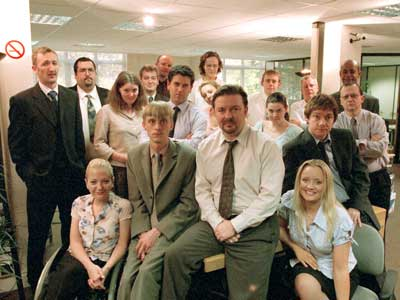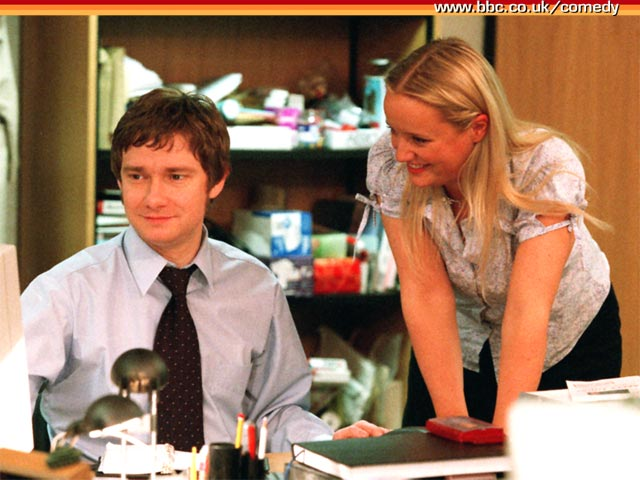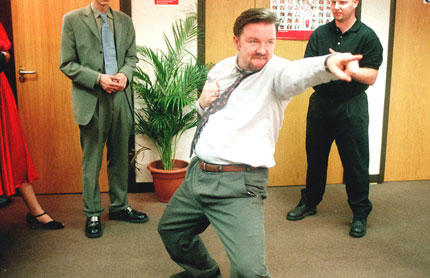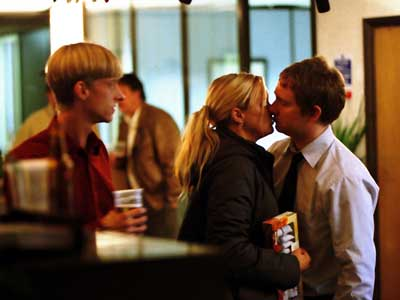The Best 10 Minutes of Television?… Ever?
by: Stephen Harrington / Queensland University of Technology
IN ADDITION TO OUR REGULAR COLUMNISTS AND GUEST COLUMNS, FLOW IS ALSO COMMITTED TO PUBLISHING TIMELY FEATURE COLUMNS, SUCH AS THE ONE BELOW. THE EDITORS OF FLOW REGULARLY ACCEPT SUBMISSIONS FOR THIS SECTION. PLEASE VISIT OUR “CALLS” PAGE FOR CONTACT INFORMATION.
By any measure, The Office (and I talk here about the original, British version) has been an immense success. The show that – discounting two Christmas specials from 2003 – ran over just 12 half-hour episodes1 picked up two Golden Globes, six BAFTA awards, spawned an American version (starring Steve Carrell) and made Ricky Gervais, the show's co-writer, co-director2 and lead actor white-hot property in the world of television. Commercial success aside, the show – which centres around the trials and tribulations of the Slough branch of Wernham Hogg (paper merchants), lead by the hapless regional manager David Brent (Gervais) – has had an amazing impact on popular culture. Perhaps partially due to strong DVD sales which now provide a longevity for television series that they may otherwise have never enjoyed (I've never actually watched a broadcast episode of The Office), the show has been one of the most popular British television programs of the last decade.
But what is all the fuss about? What is it that made the show so good in the first place? It has been written about endlessly by media pundits, but, even then, attempts to actually explain what makes The Office really great have been few if any. On this point though, I wish to start making up some lost ground, and examine a few moments from the last 10 minutes of the show's finale.

The final episode of The Office is the second of two specials originally broadcast over Christmas 2003.3 In the last ten minutes of the show, we pick up with the employees of the Slough branch of Wernam Hogg in the midst of the workplace Christmas party where former receptionist Dawn – who is about to return to the United Sates where she now lives an un-glamorous life with her fiancée Lee – is trying to say goodbye to Tim: the man with whom she spent two series mired in sexual tension. Here we truly feel the pain that moment holds. How do you say goodbye (we presume, forever) to someone you can't express feelings for? The nervousness of both sees them say very little and make strained attempts to ignore the elephant in the room that is their mutual admiration, choosing instead to say goodbye as if they were mere colleagues. Tim opts not to make a grand gesture of love, and instead chooses to avoid the possibility of embarrassment and lets Dawn walk out of his life with a man who does not appreciate her. As the audience, we are so aware of how difficult it is for them both, but this is so subtly portrayed in the two characters. Although the show is a sitcom, this moment is a comedic desert, and is actually very 'real' and believable, mainly because Tim and Dawn (like most normal people in emotional situations) try desperately to pretend there is, in fact, nothing to get emotional about.

Meanwhile, David has brought to the party a blind date, Carol, who is simultaneously beautiful, intelligent and, unlike his previous blind dates, actually interested in him. And, for the first time, well, ever, as far as the audience is aware, David does not say something stupid to mess everything up. Throughout the show, David's completely terrible management and awful, unsuccessful attempts to be a popular leader are certainly the key source of comedy. He says and does some truly awful things, and yet the twist is that one really cannot help but develop feelings of pity for the man. Throughout the show you're kind of left hoping that something might finally work out for the guy – and, with Carol, something finally does. In a conversation with her he is, perhaps for the first time, open about his own failures, saying to Carol that he is not doing very well in his career and is embarrassed by the way he is treated. It is as though progressive lull in his life has required him to finally be emotionally honest with others and is, at last, getting some admiration from a female for exactly this. This demonstrates so beautifully one key characteristic of the human condition: that so often we get what we're looking for only once we stop trying desperately to find it.

Now speeding away from the man she really adores in a cab with her drunk, semi-conscious fiancée sitting in the front seat, Dawn opens a Christmas present from Tim [I won't spoil completely everything for those who haven't seen it by revealing what it is], and begins to cry.
Returning to the party after seeing Carol off in a cab, David comes across his boss (from the second series) Neil, and 'best mate' Chris Finch. Throughout the show, 'Finchy' is held up in awe by David because he thinks he is so smart, so funny and can drink like a fish. He is really everything David wants to be, but isn't. In reality David – who dramatically overestimates his success in life – and his inability to openly acknowledge (let alone laugh at) his weaknesses and mistakes seems to be a hilariously awkward façade, behind which is a man who is painfully self-aware. He is like the class-clown in school – the source of much laughter, but also pity, because everyone knows he will never get what he really craves: respect. This lack of respect for the man shows as Chris makes a joke about Carol, insinuating that she is ugly. Suddenly though, something changes. At long last David realises he doesn't have to look up to a guy who has continually laughed back at him, and now responds to Chris' joke with a marvelously delivered '… why don't you f–k off'.
The final stirring moment of the show comes as Dawn returns to the party. Without any fuss, or even a spoken word, she approaches Tim and kisses him. In typical Office style, Gareth (Tim's perpetually-annoying co-worker) interrupts them by blurting: “careful, she's got a fiancée”… This moment was seemingly forever in the making and is long overdue for the waiting audience, and yet its flaws – i.e. Gareth's interruption – make the moment more genuine, and more realistic, rather than take any gloss off it.

I think that The Office is an extraordinary comedy series because it acknowledges the fact that real humour most often comes at unexpected moments, in the most mundane situations. The moments in real life that make us hurt with laughter are regularly unintentional, and seldom come from a precisely-delivered one-liner. That's what makes this show very good. What makes this 10 Minutes of television truly great though, and what sets it apart from other comedies (and the reason I haven't spent much time discussing humour here) is its ability to deftly mix comedy with such human emotion. However over-the-top some of these characters may be, they act, react and experience emotions in a way most real people do: and for this they're believable. I think this is indicative of The Office's success overall, because it so brilliantly reminds us that so often in real life, genuinely funny moments aren't a result of perfectly-timed jokes, that authentic, heartfelt romance is unspoken and comes without fanfare, and that we feel for people most when they are deeply flawed – and not just in an Ally McBeal sort of way. For me, this 10 minutes of television is about as good as it gets.
Notes
1. Interestingly, another much-celebrated British sitcom Fawlty Towers, also ran for just 12 episodes.
2. Stephen Merchant (who plays the role of Darren Lamb alongside Gervais in their new show Extras) was co-director and co-writer of The Office.
3. These two episodes were stylistically quite distinct, in that they are far more self-referential as mockumentaries (or at least, textually self-aware).
Image Credits:
1. The cast of The Office
2. Tim and Dawn
3. David Brent (Ricky Gervais)
4. Gareth watches on as Dawn kisses Tim
Please feel free to comment.
What is “success”?
Thanks for an article on this show! I have been a fan from the first time I saw it, even though sometimes the episodes’ humor pained me so much I could only watch a couple before I had to take a break. Reading your comments about the final episode and Gervais’ character made me think about his personae on this show and Extras (which I also have to watch in short spurts or I want to jump through the television and stop the show).
In The Office, David Brent so badly wants to impress people, especially all the “wrong” people. His “f- off” to Chris as described above is a validation to those of us who kept rooting for him to figure out what’s really important in life, and I think the charm of his character is linked to our gut feeling that David has that potential. The gut feeling that deep down his earnestness is just misdirected, but entirely honest at the core, and that his misdirections or downright lies (caught “on film” as it were) stem from such a lack of self-esteem that we have a hard time hating him even at his worst.
I am inclined to see Gervais’ Extras character Andy Millman as a sort of next step in character evolution from David. In Extras, Andy desperately wants attention and validation just as David does on The Office (and don’t we all). The crux of the problem in Extras is that (contrary to David) Andy wants that recognition from the “right” people. He wants his work to be critically successful, and instead he’s only popular with the lowest common denominator audience. Andy still has character flaws, including arrogance, but to me he at least seems to have some of his priorities more in place than did David. The lesson here, though, is that even with those priorities more in place, “success” in meaningful terms is less based on fleeting fame and more based in your friendships (i.e. your loyalties, your personal integrity, and how you handle crises), ultimately the same message of The Office.
Cheated… just a little?
I agree that this is a great 10 minutes of television, but I wonder how representative these two episodes are of the rest of the series? In addition to the stylistic departure, these final episodes (like other series’ conclusions, Sex and the City comes to mind) seem to differ from the rest of the show with their storylines that wrap everything up almost too neatly. Made after the series originally ended, these last two episodes’ romantic pairings seem a little forced– going against what I took to be the charm of the series: an endearing privileging of peoples’ pathetic moments and unrequited love.
As Harrington points out, when Tim and Dawn fail to communicate, it is “real and believable” and that the “key source of comedy” of the show are David’s awkward moments. So without trying to seem like to much of a pessimist, I just wonder if anyone else felt slightly cheated by the blissful pairings that took place over these last two episodes?
christmas specials and ‘specialness’
I certainly didn’t feel cheated by the blissful last ten minutes of the The Office’s two-parter Christmas Special. For me it wasn’t just that the low-key naturalism of performance was maintained throughout, and that Gareth’s interjection to Tim and Dawn was perfectly in character. Nor was it just that sometimes, good things happen to people in real life, or that sometimes, like Dawn, real people manage to wake up (with the help of someone like Tim) and pull out of the stifling grip of a dull relationship that’s slowly killing their sense of self. Admittedly, those things were still an important part in my consent to being suckered in by the show’s reality effect.
However I think one of the most important reasons why I didn’t feel cheated by those ten minutes (during which I laughed, I cried, and I danced around the room with elation) is because they felt like the best possible payoff for the darkness we had to endure at the end of the first half. *Those* ten minutes at the end of part 1, where David digs himself into the blackest of social black holes during a D-list celebrity night club appearance, were some of the most (intentionally) gut-squirmingly awful moments of comedy television. Sure, it was in some ways a turn to classical narrative structure, where the harder the suffering endured by the hero, the sweeter when he pulls through.
I also think though that we have to bear in mind the function and format of Brit-com Christmas Specials here, to understand the differences between the series proper and this two-parter. Christmas specials (at least, the best of them) are not meant to be ordinary television viewing. Aren’t they supposed to induce a warm post-Turkey-and-pudding-glow in the audience? The repetition of mundane incidents and characters continually falling into the same patterns of behaviour that characterize the weekly series/serial doesn’t cut it for Christmas specials – as the name suggests we want something ‘special’.
One of the most beautiful things about The Office Christmas special is that, while it gives us this most satisfying of endings, the writers still uphold the show’s mock-reality TV premise, telling us that life will continue for Tim, Dawn, David and Gareth after the cameras have left Wernham Hogg. A line of dialogue to camera, words to the effect of, ‘come back and see me next week, you might find things different’ allows us to imagine that this might just be one moment of Christmas-inspired bliss for characters and viewers alike, before, off-camera, David cocks things up again and his life sinks back into the shit.
lovely to see
Can I just add how delighted I am not only by Stephen’s article but also by the tenor of the comments that have been posted in response to it?When I wrote an article for Flow a few weeks back suggesting that maybe the reason the eightie’s TV show Dallas was successful was because it was actually very good, the response was a torrent of negative feedback (including some personal abuse!) claiming that the program wasn’t good at all, and the only reason it was so massively popular on a global scale was because international distributors forced it onto local programmers, and there were constraints to the choices that viewers have in their cultural consumption which forced them to watch it, etc etc etc (all points which, as anyone who knows anything from the production side of TV about trying to get audiences to stay loytal to a show, is nonsense). And that suggesting that Dallas was good meant that I was just celebrating popular culture, or writing unworthy fan letters that didn’t count as real academic work …It’s so refreshing to see discussion of a television program that states that the writer believes the program is good, and worthy of serious intellectual analysis – and then to see readers respond in kind.Good on ya Stephen. Maybe we can take on the mass culture pessimists who think that the masses are only truly free when they choose to watch art films!
contemporary elements of great television
some people may be suprised at “the office’s” enormous popularity, but the only thing that seperates “the Office” from other popular shows is its mundane backdrop. alot of television shows deal with spectacular back drops, with exaggerated characters that are saturated in their own personalities without budging. What seperates “the Office: from other shows is that the audience can relate to not only the characters within the show but the setting in which they interact. However the “escapism” that most viewers look for while watching television is not lost. “the Office” blends a cinematic set that has depth and documentary style camera shots, so well that the show has an element of realsim un-matched by any other show on television comedy or drama. But more then anything “the Office” has essential elements that any and all television shows need in order to be successful and that is a combination of character development, comedic timing, and good drama. Ten years from now we will know the impact of “the Office” on television because the show has raised the bar on T.V. comedy and developed a successful formula that will be copied for years to come.
The Office is a great show and I was really happy to read an artcile in which I totally agreed with the author. I think that this show has become such a success because it creates a sense of reality that is more real than anything currently on reality television. Despite being a television show, the characters each have their own way of allowing me to connect them to someone I know in my personal life. The kiss at the end is a perfect moment because it gives the sexual build up between Tim and Dawn a lot more meaning and a sense of real life romance. I find that most love scenes between two characters lusting for each other always end up far too sexual without any of the romance that was initaially revealed at the beginning of the show. The Office has such a mundane setting and characters that are not too exaggereated making for better televsion. I am not surprised by its success mostly beacuse I think people are sick of seeing the same old stuff and The Office brings a much more unique setting to the comedy genre.
I really enjoyed the message this article presented. It was nice to hear about the “real” moments the show had to offer. Those moments go unappreciated in this show so many times and I think the author made very good points. This show is not all about the comedic moments that give the show it’s genre but more about the emotional “real” moments that make it relatable. I found the episode on YouTube and watched it for the first time after reading this article and the authors arguments for why this show is awesome really came out to me. Great article!
J’apprécie la façon dont vous abordez ce sujet. Je dois dire que je ne regrette en rien de m’être abonné à votre weblog. Continuez !
It’s April 2017 as I write this many years after this show was on and this article was written. I am essentially looking back from the future.
I just bought a new TV for the first time. Since it has Netflix, I looked up and found The Office. Over a few days I watched all the episodes before arriving at the two part Christmas special that marks the end of this amazing show. I had seen this show many years earlier.
While it was joyous to witness David begin to become a whole human being by finally finding the beginnings of a great relationship, it is the story of Tim and Dawn that grabbed me with its raw beauty. When Tim says that he never thought there could be a happy ending and that life is just a series of moments, the stage was set. His quiet, private encouragement for Dawn from afar with no expectation of change seemed it would be just that. A loving friend from afar seeing your best and encouraging you. Dawn changes all this.
It is breathtaking when I first realized that the person entering the office was Dawn returning in search of Tim. I watched it four times and again the next day. Each time I burst out crying in happy disbelief as Dawn finally recognizes how empty and sad her life is without Tim and leaves behind her fiancee so that she can finally and truly express her love for her best friend. Her kiss is as real and as tender as a kiss can be. Two great actors absolutely nailed this exquisite moment that they had been building towards for two seasons.
I will be eternally grateful that they created such a beautiful ending for this little jewel of characters we got to know if but for a little while. A beautiful, hopeful goodbye.
Pingback: Peter Kay’s Car Share – Another Fucking Mother
“Ten years from now we will know the impact of “the Office” on television because the show has raised the bar on T.V. comedy and developed a successful formula that will be copied for years to come.”
I just wanted to point out the enormous accuracy of this prediction, sitting here more than a decade later! The mockumentary style was so effective that it became popular to the point of over-saturation, but (as far as I’m aware) it was “The Office” that started and popularized the format.
You forgot about the fact that David finally got the whole group to laugh at his jokes in the very final scene (photoshoot).
Having just rewatched the final episode again, it was the way Tim and Dawn held hands after the kiss that got me. Fingers were intertwined in such a tender way…. Sublimely subtle!
And Gareth’s stunned look as they leave they room was priceless.
The. Excellent article and insightful comments summarise exactly why I still feel this was the best 10 minutes of television I have seen. The moment when I saw Dawn appearing out of focus in the background to take centre stage was just sublime. I just watched it again this morning and it still brings a tear to my eye. Oh and let’s not forget the magical 80’s music in the background . Definitely comedy gold.